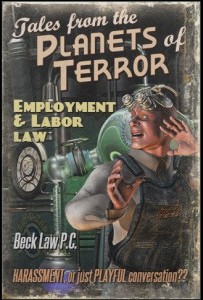Q: I’m an employer of a local business, and recently there’s been a problem between several employees. One of the employees claims the others are sexually harassing her. I’m not sure the conduct qualifies as harassment, and it seems like just playful conversation. What should I do?
A: A claim of harassment by an employee should be taken very seriously by the employer, as harassment of any type, sexual, discriminatory or otherwise, continues to be a common problem in the workplace in California. The California Code of Regulations is helpful in identifying several different layers of sexual harassment, but these principles may also be applied to other types of harassment as well:
- Where submission to harassment is a condition of employment;
- Where the choice to submit or not affects employment decisions;
- When the purpose or effect of the conduct alleged as harassment unreasonably interferes with the employee’s work performance;
- When the purpose or effect of the conduct alleged as harassment unreasonably interferes with the employee’s work performance; or
- When the conduct alleged to be harassment creates an intimidating, hostile or offensive work environment.
Fair Employment and Housing Act
2 Cal Code Regs §§7287.6(b), 7291.1(f)(1). These categories set the prohibitions on the variety of conduct by employers and co-employees. Under the Fair Employment and Housing Act (FEHA), California law defines two types of methods to prove sexual harassment in the workplace: conduct which establishes a quid pro quo, and conduct creating a hostile work environment. Lyle v. Warner Brothers Television Productions (2006) 38 Cal.4th 264, 42 Cal.Rptr.3d 2, 11.
Sexual Favoritism
Does your employee contend that the harassment is a result of some quid pro quo arrangement with another employee or manager? The California Supreme Court defined such quid pro quo harassment as conduct that leads to “sexual favoritism”, including the award of job benefits or bonuses if the employee submits to sexual advances. Miller v. Department of Corrections (2005) 36 Cal.4th 446, 461-462. However, this also incorporates the converse, such as a manager threatening to demote or take punitive action against an employee should they not submit to sexual advances or conduct requested, expressly or impliedly.
Your employee may also be referencing a claim of a hostile work environment. The California Supreme Court has also set forth the standards in Lyle in relation to what constitutes a hostile work environment sufficient to create harassment:
Under Title VII, a hostile work environment sexual harassment claim requires a plaintiff employee to show she was subjected to sexual advances, conduct, or comments that were (1) unwelcome (see Meritor, supra, 477 U.S. at p. 68, 106 S.Ct. 2399); (2) because of sex (Oncale v. Sundowner Offshore Services, Inc. (1998) 523 U.S. 75, 80-81, 118 S.Ct. 998, 140 L.Ed.2d 201 (Oncale)); and (3) sufficiently severe or pervasive to alter the conditions of her employment and create an abusive work environment (id. at p. 81, 118 S.Ct. 998; Meritor, supra, 477 U.S. at p. 67, 106 S.Ct. 2399). In addition, she must establish the offending conduct was imputable to her employer. (Meritor, supra, 477 U.S. at pp. 69-73, 106 S.Ct. 2399.)
Lyle, 42 Cal.Rptr.3d at 12. Whenever an employee performs any type of investigation prompted by a claim of harassment, these three elements are necessary and essential questions to ask and conclusions to determine before taking any action. It may very well be that such “harassment” is in fact nothing more than workplace conversation which the employee has taken out of context, for the mere discussion of sex or vulgar, sexual language is generally insufficient to show the harassment was “because of sex”; the conduct must involve some treatment to the employee on the basis of sex itself.
In either sense, every employer should take a claim of harassment seriously. If you are employer, and believe there may be a problem at your workplace as a result of harassment, or if you are an employee who feels harassed by co-workers or managers, contact an attorney for legal advice on how to protect your rights and stop workplace harassment.

